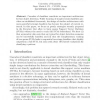Free Online Productivity Tools
i2Speak
i2Symbol
i2OCR
iTex2Img
iWeb2Print
iWeb2Shot
i2Type
iPdf2Split
iPdf2Merge
i2Bopomofo
i2Arabic
i2Style
i2Image
i2PDF
iLatex2Rtf
Sci2ools
142
click to vote
DAGM
2007
Springer
2007
Springer
Greedy-Based Design of Sparse Two-Stage SVMs for Fast Classification
Cascades of classifiers constitute an important architecture for fast object detection. While boosting of simple (weak) classifiers provides an established framework, the design of similar architectures with more powerful (strong) classifiers has become the subject of current research. In this paper, we focus on greedy strategies recently proposed in the literature that allow to learn sparse Support Vector Machines (SVMs) without the need to train full SVMs beforehand. We show (i) that asymmetric data sets that are typical for object detection scenarios can be successfully handled, and (ii) that the complementary training of two sparse SVMs leads to sequential two-stage classifiers that slightly outperform a full SVM, but only need about 10% kernel evaluations for classifying a pattern.
DAGM 2007 | Fast Object Detection | Image Processing | Object Detection | Sequential Two-stage Classifiers |
| Added | 14 Aug 2010 |
| Updated | 14 Aug 2010 |
| Type | Conference |
| Year | 2007 |
| Where | DAGM |
| Authors | Rezaul Karim, Martin Bergtholdt, Jörg H. Kappes, Christoph Schnörr |
Comments (0)

